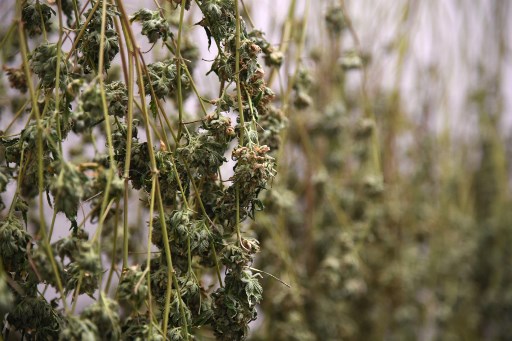
/ AFP / Robyn Beck/
WASHINGTON, United States (AFP) – The US Justice Department on Thursday reversed official policy that had tolerated the growing state-based movement to legalize marijuana sales, just three days after California formally permitted recreational use of the drug.
Announcing a “return to the rule of law,” Attorney General Jeff Sessions rescinded five key memos issued by the administration of president Barack Obama that discouraged enforcement of federal laws, which still classify marijuana as a dangerous narcotic like heroin.
That reversed the election campaign stance by President Donald Trump favoring state marijuana laws, and set up a potential clash with the six US states that have already moved ahead to legalize pot sales.
Colorado, Washington, Oregon, Nevada, Alaska and California have legalized sales, while Massachusetts is planning to do so this year, and legalization is under debate in Maine.
“It is the mission of the Department of Justice to enforce the laws of the United States, and the previous issuance of guidance undermines the rule of law and the ability of our local, state, tribal, and federal law enforcement partners to carry out this mission,” Sessions said in a statement.
Sessions did not order a new crackdown on pot sales and use, but told federal prosecutors they could act as they see fit in their districts, leaving the course of implementation unclear.
Clash with states
He directed federal attorneys “to use previously established prosecutorial principles that provide them all the necessary tools to disrupt criminal organizations, tackle the growing drug crisis, and thwart violent crime across our country.”
Nevertheless, the move was seen as a signal that the government is likely to resist more legalization and decriminalization of cannabis, if not try to reverse the trend.
The pro-legalization Marijuana Policy Project said Sessions’ shift would only encourage the illegal drug trade and harm people using marijuana as a medicine, which 29 states have legalized.
“We really need Congress to take action so that Sessions no longer has the authority to decide whether or not the federal government should interfere in state level marijuana laws,” said Matt Schweich, MPP interim executive director.
Politicians and officials from several states lashed out at Sessions’ move, most indicating they will continue to back recreational pot sales.
“In California, we decided it was best to regulate, not criminalize, cannabis… After all, this is 2018 not the 20th century,” California state Attorney General Xavier Becerra said.
“At the California Department of Justice we intend to vigorously enforce our state’s laws and protect our state’s interests.”
The US Attorney for Colorado, Bob Troyer, made clear there will be no change in his stance locally, saying his office has “already” been applying the principles laid out by Sessions in its marijuana prosecution decisions.
Oregon Senator Ron Wyden accused Sessions of pursuing “his extremist anti-marijuana crusade,” while Nevada Senator Catherine Cortez Masto said Sessions was “creating unnecessary confusion.”
Law-and-order crackdown
“Nevada voters made it clear that the state should be able to enforce its marijuana laws without federal interference. We must respect the will of states while ensuring prosecutorial resources are used effectively,” she said.
Sessions — who has made fighting drug trafficking a key Justice Department policy since taking office a year ago as part of President Donald Trump’s administration — has been a vocal opponent of liberalizing marijuana laws.
But he hinted in his confirmation hearing in January 2017 that enforcing federal laws against recreational pot users might not be the best use of Justice Department manpower.
During the 2016 election campaign, Trump took a more tolerant stance, saying several times that he would leave the issue up to local authorities.
“When you look at what’s happened in Colorado as an example, it’s a local thing,” he told Boston’s WBZ NewsRadio. “I wouldn’t interfere with it. I think that’s something that really is very much up to the local area.”
But since becoming president, he has been mum on the subject, supporting Sessions’ tough law-and-order policies.
Sessions’ announcement sent the shares of US companies in the legal marijuana trade plummeting between 13 and 31 percent. Canadian pot companies were also hit, though losses were mostly under 10 percent.








